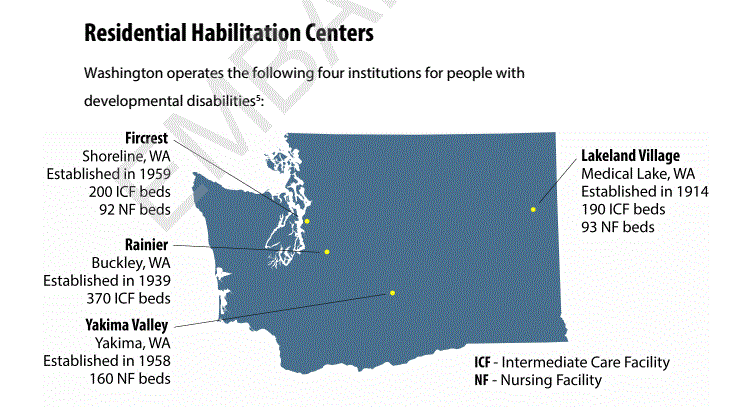
Sexual Assault, Near Drowning, Choking To Death: Report Highlights ‘Failures’ At State Institutions
Listen
Last year, developmentally disabled residents in Washington state institutions choked to death, were sexually assaulted and nearly drowned. That’s according to a report being released Wednesday by Disability Rights Washington.
The report titled “No Excuses” chronicles what it calls “failures and tragedies” that occurred in 2016 at Washington’s Residential Habilitation Centers (RHC). According to the report at least one resident died, two were sexually assaulted and others were seriously harmed.
David Carlson with Disability Rights Washington (DRW) told the story of one resident at the Rainer School in Pierce County who was left on a dock strapped into a wheelchair with a faulty brake.
“What did they do after they strapped him into a wheelchair with a brake that doesn’t work very well? They walked away and he rolled into the water and nearly drowned,” Carlson said.
During another outing, a Rainier School resident choked to death on a peanut butter and jelly sandwich that wasn’t properly cut up as required by his dietary plan. That death came almost a year to the day after a Rainier School resident choked to death on a hotdog during an outing.
The report also highlights residents of RHCs who weren’t prevented from engaging in acts of self-harm, a developmentally disabled man who was found malnourished and a staff member who was reported to be sleeping on the job “75 percent of the time” when she was supposed to be providing one-on-one supervision of a client.
In November of 2016 a counselor at the Rainier School was accused of sexually assaulting a female resident. A second resident later came forward and said she too had been assaulted. That employee was later fired and charged with raping one client.
According to the DRW report, “several staff members … verified that no training had been given to identify sexual trauma in adults with developmental disabilities.”
The “No Excuses” report also highlights mental abuse of residents, improper medical care and medication errors.
For instance, at the Yakima Valley School in Selah, one resident “was given the wrong medication nine times.” A later investigation determined the facility did not have the proper procedures in place to prevent medication errors.

Washington state runs four Residential Habilitation Centers that house more than 800 disabled people.
DISABILITY RIGHTS WASHINGTON
“These institutions are not doing their core function of keeping people safe while giving them the services they need,” Carlson said.
In response, Washington’s Department of Social and Health Services said the well-being of its clients is its top priority.
“For all of those statements of deficiencies, we have given back a plan of correction,” DSHS spokeswoman Kelly Stowe said. “A majority of them have been fully implemented and the rest are in progress.”
Washington has four institutions that house more than 800 disabled people. The information in the “No Excuses” report comes from the state’s own surveys of conditions in those facilities.
RHCs are required by law to provide “active treatment” to residents and not just warehouse them. There’s a movement nationally to close state institutions and place severely developmentally disabled people in homes where they’d live in smaller groups, with a goal of making them part of their surrounding communities.
So far Washington state has resisted calls to close its institutions.
“This report doesn’t necessarily lead to the conclusion that institutions should be closed,” Carlson said. “But we think it does support that proposition.”
9(MDAyOTk4OTc0MDEyNzcxNDIzMTZjM2E3Zg004))
Related Stories:

How does climate affect your life? Tri-Cities survey open now
Cities, towns and counties are starting to plan for a future with climate change. Now, the Tri-Cities area is asking people about regional hazards and historical trends. (Credit: Simon Foot

Con manifestación en Tacoma, Unión de Campesinos llama a boicot contra Windmill Mushrooms
Personas de diferentes lugares del estado de Washington viajó a Tacoma para manifestarse en apoyo a los trabajadores agrícolas frente a una tienda Safeway el lunes por la tarde.

NASA astronaut José Hernández inspires students during visit to Tri-Cities
Surrounded by students seeking autographs and photos, astronaut José Hernández finished one of his conferences at Pasco High School.












